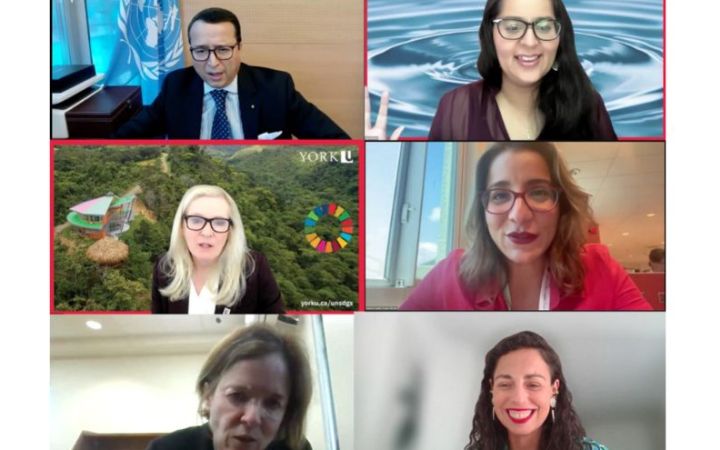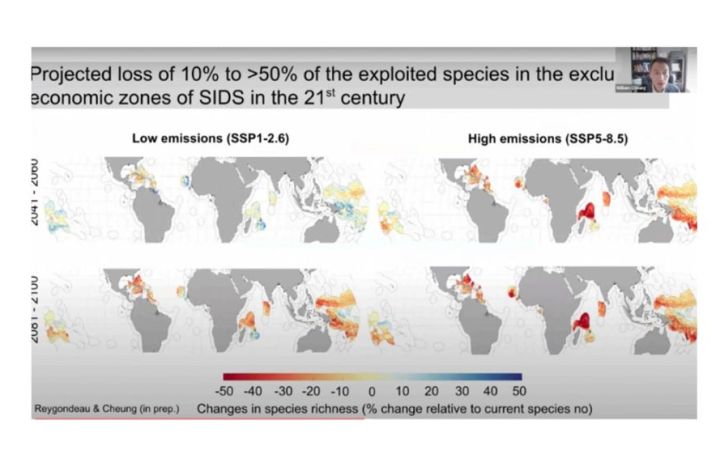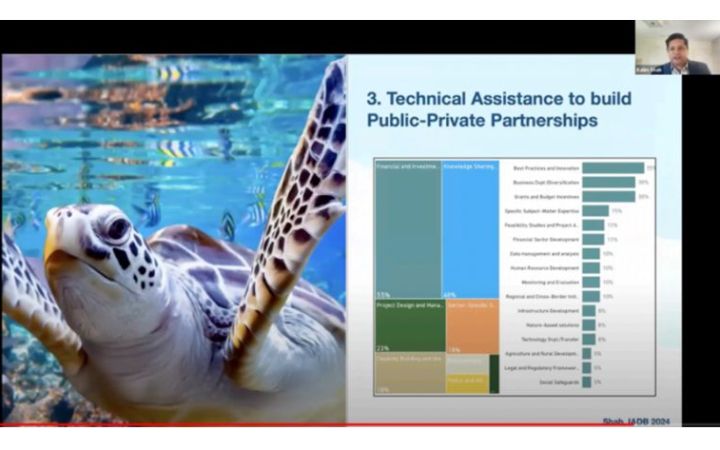29 May 2024, Geneva, Switzerland – UNITAR’s Global Water Academy (UGWA) proudly hosted the side event entitled, ‘Blueprints for Prosperity: Building Resilience for SIDS Through the Blue Economy’ at the 4th International Conference on Small Island Developing States (SIDS4) in collaboration with York University as UGWA Academic leads, and UGWA partners IRC Wash.
The theme of the side event was ‘Navigating the Blue Future’, to foster SIDS discussions on sustainable growth through blue economy innovation with partner organizations. The importance of establishing SIDS blueprints for sustainable maritime management provides insights and opportunities to enhance transboundary cooperation, innovative climate finance mechanisms, and climate action plans for resilience. The panel consisted of experts from the policy, research, humanitarian, and industry fields providing case studies and data analytics on the main challenges and recommendations for opportunities of blue economy mechanisms to promote independence and capacity building. Exploring the upcoming innovations for financing climate-resilient industries can provide a path forward for SIDS to lead climate action planning coupled with research-oriented financial systems.
Opening Remarks
The panellists exploring these themes consisted of Mr Alex Mejia, Director, of the Division for People and Social Inclusion, UNITAR; Dr Rhonda Lenton, President and Vice-Chancellor, York University; Ms. Marion Barthelemy, Director, UNOSAT, Ms. Claudia Taboada, Director, of Science, Technology, and Environment, Ministry of Foreign Affairs, Dominican Republic; Prof. William Cheung, Director, Institute for the Oceans and Fisheries, University of British Columbia; Dr. Catarina Fonseca, Director of Pusling Tide, IRC-Wash; Professor, Sapna Sharma, Department of Biology, York University; Prof. Kallim Shah, Associate Professor, Energy and Environment Policy, University of Delaware; and Professor Yvonne Su, Assistant Professor, Department of Equity Studies, York University.
In the opening remarks, by the Director, of the Division for People and Social Inclusion, UNITAR, Mr Mejia stated:
SIDS are faced with unique challenges and are more and more subjective to global socio-economic situations, in particular, the reliance on freshwater security is essential for various economic activities including agriculture, and the tourism industry for SIDS…ensuring stable and reliable freshwater sources is indeed crucial for sustaining economic development and reducing dependency on external aid and other resources.
President and Vice-Chancellor of York University, Dr Rhonda Lenton, further suggested…
In reality, if even one country or part of the world is impacted by the water sustainability crisis, it impacts us all.
Panel Discussion
In Ms. Taboada's presentation, she highlighted the severe impacts of sea level rise and saltwater intrusion on the Dominican Republic and emphasized the urgent threat to the country's freshwater supplies, and core industries like tourism and aquaculture. These challenges risk exacerbating socio-economic inequality and displacement. Taboada stressed the need for accelerated blue economy development and global collaboration to address these vulnerabilities. Ms. Claudia Taboada, Director, of Science, Technology, and Environment, Ministry of Foreign Affairs, Dominican Republic
Implementation of blue economy strategies can translate to industrial growth for ocean-related industries and generating direct and indirect jobs as well as increasing tax revenues and promoting foreign direct investment.
She also underscored the importance of international cooperation, particularly in the Dominican Republic's transboundary water relationship with Haiti. Advocating for a holistic approach to leveraging local expertise, she noted the Dominican Republic's initiative in the Loss and Damage Fund, aimed at fostering innovations in marine renewable energy and infrastructure improvements.
The second lecture presented by Prof. William Cheung highlighted the threats of sea level rise and biodiversity loss. Prof. Cheung provided insights into the challenges for coastal communities on unreliable fish populations for stability and economic development. For conservation initiatives to be effective, coordinating efforts between political boundaries such as Exclusive Economic Zones with resource sharing to accommodate climate-induced changes in fish distributions and compositions. Based on IPCC assessments, Cheung pointed to the integrated solution pathways to coordinate food security, biodiversity, and ocean-based technologies to produce long-term positive impacts.
Dr. Fonseca discussed the financing challenges and opportunities for water supply and sanitation in Small Island Developing States (SIDS). She noted that the primary funding sources are long-term concessional loans, which SIDS relies on for infrastructure investments. However, these regions face significant hurdles such as market shocks from unpredictable weather and insufficient tariff bases. Additionally, SIDS often struggle with eligibility for official development assistance upon reaching high-income status while accruing debt from natural disasters. Fonseca highlighted innovative solutions like Seychelles' investment in blue bonds and debt-for-nature swaps, which offer a sustainable path for SIDS to develop blue economy projects with renewable funding sources.
Following her lecture, Professor Su emphasized the importance of local knowledge and community involvement in her analysis of conservation efforts in SIDS. Using the Philippines as a case study, she demonstrated how grassroots approaches can effectively rebuild communities after water-related disasters, such as Typhoon Haiyan. Su applied the Disaster Risk Index to highlight the variability and increasing frequency of natural disasters, along with the compounded socio-economic impacts. She argued for a shift from intermittent external aid to long-term, proactive support, stressing that local ownership and representation are crucial for sustainable infrastructure development and capacity building in response to challenges like sea level rise and hurricanes.
Moreover, Prof. Kalim Shah presented his research on enhancing resilience in Caribbean SIDS through blue economy innovation. Surveying policymakers from 13 Caribbean nations, he identified significant capacity gaps, particularly in resources and organizational capabilities needed to implement national adaptation plans. Shah emphasized the importance of infrastructure development, such as fisheries and water purification facilities, and specialized maritime management expertise. He advocated for technical assistance and the facilitation of private-public partnerships to accelerate blue economy practices and innovations, thereby strengthening the resilience and sustainable development of SIDS.
CONCLUSION
In closing the side event, Moderator Prof. Sharma emphasized the importance of proactive solutions and advocacy from SIDS coalitions to enhance water security and sanitation. Sharma further highlighted the need for transboundary management to improve information sharing and financial support. In echoing sentiments from the SIDS4 Conference, the UGWA panel stressed the importance of local ownership in financing and developing infrastructure to bolster the blue economy. SIDS can effectively address climate disaster risks by leveraging their specialized knowledge of topography and culture to inform water security policies and innovations.
On behalf of United Nations Assistant Secretary-General, and Executive Director of UNITAR, Mr. Nikhil Seth, Ms. Marion Barthelemy, Director, UNOSAT, stated live at SIDS4:
The message that you can really see here is that the SIDS of course are uniquely vulnerable but they are not powerless. [...On the ground, we spoke about how….] access to financial resources was in a way a high point of the conference and everyone looks forward to the elaboration of the multi-dimensional vulnerability index to help SIDS access concessional loans and dedicate SIDS to debt sustainability service.
Watch the online SIDS4 Side Event
Email addresses:
Dr. William Cheung - wailung@mail.ubc.ca
Dr. Catarina Fonseca - fonseca@ircwash.org
Dr. Yvonne Su - yvonnesu@yorku.ca
Dr. Kalim Shah - kalshah@udel.edu




